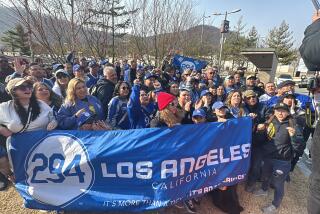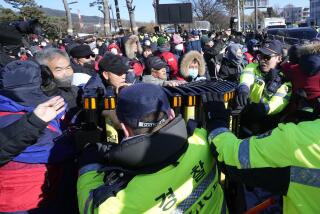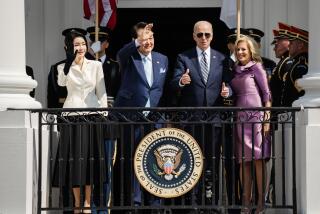Bush is greeted in South Korea by rallies for and against
- Share via
SEOUL — To some of those demonstrating on Seoul’s streets he is a warmongering cowboy looking to conscript South Korean soldiers into the war in Afghanistan, and the salesman-in-chief pushing the rest of the world to eat tainted American beef.
To others he is the president of an ally that sacrificed its own soldiers more than 55 years ago so South Koreans could be free, and still keeps 30,000 troops here to help protect them from their bellicose, nuclear-armed cousin to the north.
President Bush brought out the ambivalence in South Koreans during an overnight visit to Seoul, where the rival demonstrations showed that the country remains deeply divided over how to handle its relationship with the United States.
On Tuesday as Bush arrived, church groups and war veterans in uniform gathered on the site where others have recently protested U.S. beef imports to show their friendship for America. Under umbrellas protecting them from the searing sun and a huge banner reading, “Reinforce the Korea-U.S. Alliance,” the estimated crowd of 30,000 held a prayer service, waved the Stars and Stripes and sang the national anthems of both countries.
Not far away, a crowd of anti-Bush protesters, estimated by police to number 20,000, denounced what they described on fliers and placards as a “War Alliance.” Loudspeakers blared protest songs from the 1980s, when students led demonstrations against the U.S.-allied military dictatorship that then governed the country. Some demonstrators clashed with police, and more than 150 were reportedly arrested.
“The majority of the Korean people have been eagerly awaiting your visit,” President Lee Myung-bak told Bush as the leaders gathered for talks at the presidential residence known as the Blue House this morning.
“And of course behind these people there were those who were sort of opposed,” Lee said as Bush laughed.
Lee is well aware of the protesters’ sting. His young government has foundered amid massive demonstrations sparked by his decision to lift a ban on U.S. beef.
The restrictions had been imposed by the previous South Korean government to counter health fears arising from reports of mad cow disease in American herds. Critics accused Lee of putting the health of South Koreans at risk in an eagerness to gain favor with Washington.
The beef import demonstrations began as small candlelight vigils focused mostly on food safety. But they swelled into almost nightly protests that portrayed Lee as a stooge of the Bush administration, and an arrogant leader unwilling to listen to citizens’ concerns.
As the protests grew to include trade unions, nationalists and other groups, the blurred motivations of the protesters made it difficult to determine whether the rallies were anti-American or more generally anti-Lee.
With Lee’s poll numbers falling and with him unable to stare down the demonstrators, the president eventually apologized to the nation, reshuffled his Cabinet and other top aides, and promised to curb his tendency to act aloof.
American beef imports have resumed and the protests have petered out, though South Koreans remain wary of Lee’s dealings with Washington.
These suspicions have hindered his push to get the National Assembly to ratify a free trade deal with the U.S. The deal to lift many tariffs, painstakingly negotiated over several years, has also been held up by the Democratic-controlled U.S. Congress.
And though U.S. officials had said on the way to Seoul that pushing for a Korean role in Afghanistan would be “at the heart” of discussions between the presidents, Lee said today that the prospect of sending Korean combat troops to join the Western coalition in Afghanistan had not been raised.
More to Read
Sign up for Essential California
The most important California stories and recommendations in your inbox every morning.
You may occasionally receive promotional content from the Los Angeles Times.










